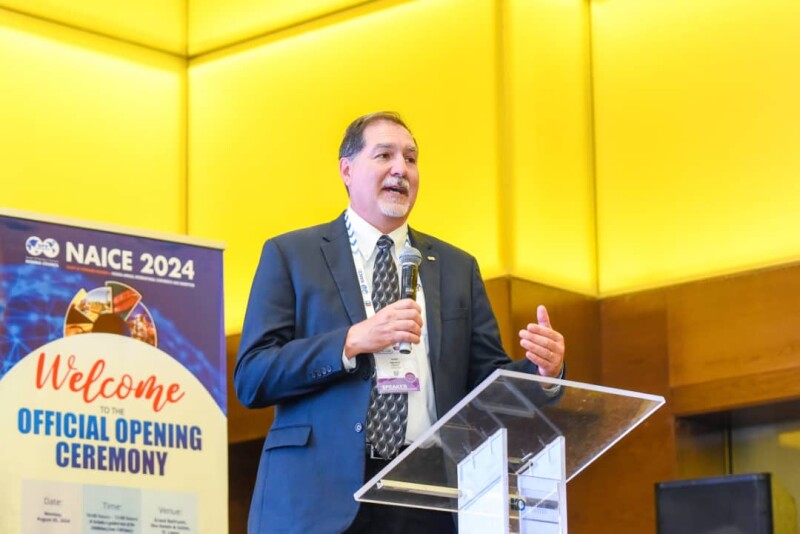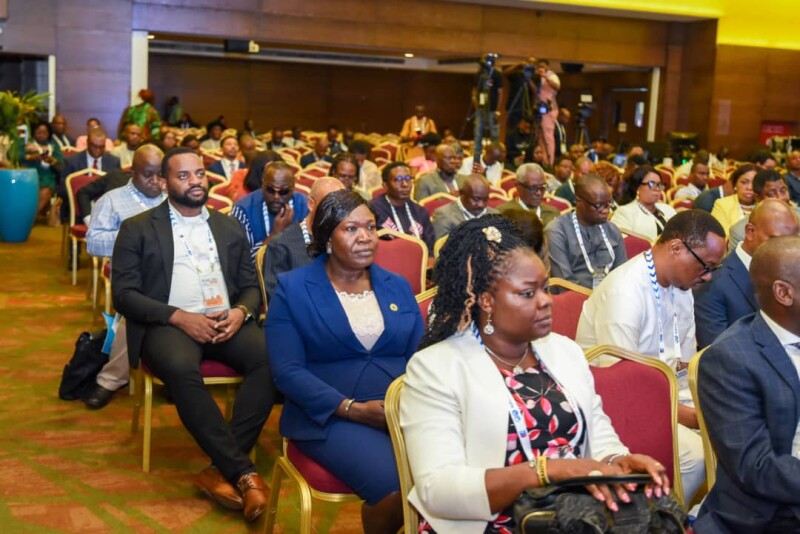The Nigerian Annual International Conference and Exhibition (NAICE) is a premier gathering of industry professionals, stakeholders, academics, and students from across the globe, all converging to discuss the latest trends and technical developments in the oil and gas industry.
This year’s NAICE continued its tradition of addressing pivotal topics, focusing on the midstream and downstream sectors—one of the most critical areas in the Nigerian energy landscape. The theme for 2024, "Petroleum Industry Value Chain Optimization: The Inevitability of Midstream and Downstream Development," underscored the importance of advancing these sectors to optimize the petroleum value chain.
For Nigeria—a nation persistently grappling with the challenges of petroleum product importation—the midstream sector plays a crucial role. In addition, it serves as the vital link in the petroleum and natural gas value chain, enabling the processing of crude oil within the country to meet growing domestic and industrial demands. Strengthening this sector is essential for building a more robust and prosperous economy.
The downstream sector, responsible for the distribution and strategic pricing of petroleum products, is pivotal for ensuring the economic viability and sustainability of the industry. As the industry moves toward a future powered by clean and sustainable energy resources, the downstream sector must prioritize economic efficiency, sustainability, and the adoption of cutting-edge technologies to optimize operations, reduce carbon emissions, and enhance overall performance.
In his remarks, Salahudeen Tahir, chairman of SPE’s Nigeria Council, emphasized that the development of the midstream and downstream sectors is essential for optimizing operational efficiency, promoting sustainability, and maintaining a competitive edge in the global market. By adopting a holistic approach and leveraging technological advancements, the industry can achieve significant improvements in both profitability and environmental stewardship.
The conference featured a series of insightful presentations, keynote addresses, and technical discussions, all centered on fostering innovation, growth, and progress within the industry.

The SPE NAICE Conference featured a distinguished lineup of keynote speakers, including Terry Palisch, 2024 SPE President; Herbert Krapa, Minister of Energy, Ghana; Farouk Ahmed, CEO, NMDPRA; Roger Brown, managing director (MD)/CEO, Seplat Energies; Elohor Aiboni, MD, SNEPCO; Gbite Falade, MD/CEO, Aradel Holdings; Sanjeev Verma, vice president, Halliburton; Audrey Joe-Ezigbo, MD, Falcon Corporation; and Debo Fagbami, MD, NEDOGAS. These leaders delivered compelling addresses that set the tone for the conference.
Their presentations provided valuable insights into the future of the energy industry, touching on several key themes.
- Innovation and digitalization: A strong call to action for the energy sector to embrace innovation and digital transformation as critical drivers of future success.
- Sustainability and energy transition: Emphasis on the importance of robust policy frameworks to support and accelerate the energy transition.
- Strategic navigation: Highlighting successful strategies for navigating the rapidly evolving energy landscape.
- Technological breakthroughs: Highlighting cutting-edge technologies with the potential to revolutionize the energy sector.
The SPE NAICE 2024 conference featured two panel discussions with the first panel’s theme of “Unlocking Upstream Value: Developing Markets, Trade Access, and Facilitating Partnerships in Midstream and Downstream.”
This session focused on the pivotal role of regulatory frameworks in enhancing market access, trade, and partnerships within the midstream and downstream sectors. Given Nigeria's ongoing efforts to strengthen its petroleum industry, these discussions were particularly relevant, and the discussion covered several key areas.
- Policy analysis: Evaluating policies that streamline trade and incentivize strategic partnerships, especially in the context of Nigeria’s energy transition and economic diversification efforts.
- Regulatory strategies: Exploring how regulatory measures can improve market access and foster collaboration, with a focus on enabling Nigeria to harness its full potential in the midstream and downstream sectors.
- Enabling trade practices: Investigating how well-structured regulatory frameworks can serve as dynamic enablers for efficient trade practices and strategic alliances, ultimately contributing to a more sustainable and self-reliant energy industry in Nigeria.
The session aimed to provide stakeholders with valuable insights into how effective regulatory approaches can cultivate a vibrant marketplace and promote collaboration across the midstream and downstream industries which are essential for building a prosperous economy.
The second panel focused on “Energy Security: Exploring the Interplay Between Technology, Market Dynamics, and Organizational Capabilities.”
This session delved into the intricate relationship between technology, market dynamics, and organizational capabilities within the midstream and downstream sectors. As Nigeria looks to optimize its energy value chain, the integration of advanced technologies and adaptive organizational strategies becomes crucial. Key discussion points included:
- Technology’s impact: Examining how technological advancements, such as digitalization and automation, are reshaping investment landscapes and influencing market dynamics in Nigeria’s energy sector.
- Organizational adaptability: Investigating how organizations can adapt to optimize investment strategies in a rapidly changing environment, with a particular focus on navigating the complexities of Nigeria’s energy markets.
- Symbiosis of innovation and efficiency: Exploring the interplay between innovation, market trends, and operational efficiency to drive competitive advantage, especially as Nigeria moves toward adopting hydrogen-based hydrocarbons and other clean energy alternatives.
The goal was to provide insights into how emerging technologies can enhance profitability and maintain a competitive edge in the midstream and downstream industries, guiding investors to capitalize on untapped opportunities and positioning Nigeria as a leader in the global energy transition.
NAICE 2024 Young Professionals Workshop
The YP workshop, “Market Trends and Economic Outlook in the Downstream and Midstream Sectors: Roles and Opportunities for Young Professionals,” provided insights into market trends and career opportunities, exploring the economic potential available to YPs in the midstream and downstream industry. By delving into current market dynamics, emerging trends, and key economic indicators, participants gained a thorough understanding of the sector’s future landscape.
This workshop empowered YPs with the knowledge and insights needed to successfully navigate the ever-evolving midstream and downstream sectors and to capitalize on the emerging opportunities that will define the future of the industry.
NAICE 2024 Women Leadership Program
This panel discussion titled “Equality By Design: Formulating Leadership Strategies to Ensure Gender Inclusivity in the Petroleum Value Chain” delved into the concept of "equality by design," with the goal of embedding gender inclusivity throughout Nigeria’s oil and gas value chain. Panelists shared insights on proactive strategies such as leadership development, mentorship programs, and inclusive policies aimed at fostering gender equity in corporate settings.
Key discussion points included:
- Strategic Leadership Approaches: Developing leadership strategies that actively dismantle gender barriers within the industry.
- Equitable Representation: Ensuring fair and balanced representation of women at all levels of the petroleum value chain.
- Fostering Innovation and Efficiency: Highlighting how gender inclusivity can drive innovation and enhance operational efficiency.
- Addressing Unique Challenges: Identifying and overcoming the unique challenges faced by women in the oil and gas sector.
This roundtable discussion “Addressing Unconscious Bias: Creating a Fair and Equitable Culture in the Oil and Gas Industry” focused on the pervasive issue of unconscious bias within the oil and gas industry and fostered a collaborative dialogue on creating a fair and equitable workplace. Esteemed industry leaders participated in the discussion, offering their perspectives on the current state of unconscious bias, psychology of bias, success stories, and practical tools to promote diversity inclusion across the industry.
Conclusion and Way Forward
The conference concluded with a powerful call to action, uniting industry leaders and professionals in their mission to shape a sustainable energy future. Additionally, the conference culminated in a shared vision focused on innovation, collaboration, and inclusivity, recognizing the dynamic shifts within the energy landscape. Embracing digitalization and low-carbon technologies, the SPE NAICE community pledged to drive progress and foster meaningful partnerships.
More so, this year’s conference was a rewarding experience, offering an abundance of ideas and intellectual resources, and creating opportunities for global economic synergy and growth. To support this claim, the SPE Nigerian Council Chairman noted, “This year’s conference addressed current market trends and economic outlooks, emphasizing the importance of inclusivity and leadership development within our industry.”
Indeed, NAICE 2024 was not only an enriching experience but also a celebration of industry achievements, providing valuable insights and networking opportunities that will resonate well beyond the event. Consequently, the path forward is clear: harnessing collective expertise, developing a skilled and diverse workforce, and effectively navigating the energy transition.
With renewed purpose, the SPE Nigerian Council community looks to the future, prepared to tackle the challenges and seize the opportunities that lie ahead. The conference’s legacy will continue to inspire professionals, equipping them with fresh insights and a shared commitment to building a brighter energy future.


